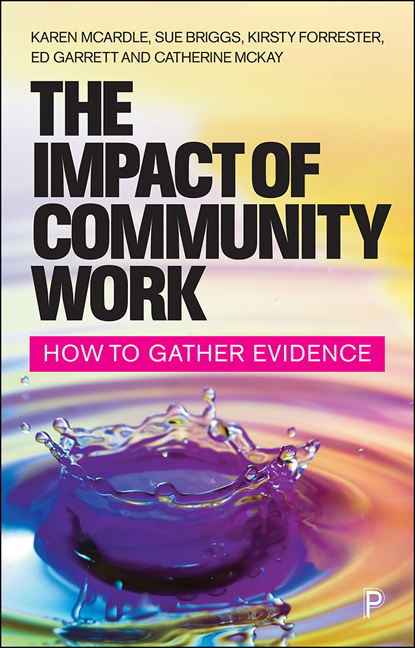12 - The Long Haul: Longitudinal Studies
Published online by Cambridge University Press: 10 March 2021
Summary
Introduction
Often with work in the community, we know that the impact of the work will be long term rather than short term. Often, however, funding and political concerns require that we show evidence of impact at the end of a short-term funding period. It is often the case that we meet people who say that if it hadn't been for our intervention, their life would have been a disaster. This is evidence of impact in the long term. If, as is the case for many of the social professions, such as youth work, community work, social work or adult education, we work knowing that people may not fully realise the change that has occurred until later on in their lives, we need to consider longitudinal studies. For those who operate exclusively in the short term, the types of initiative that have a long-term impact are those which work with vulnerable groups of people or that seek attitude and behavioural change, such as growth in self-esteem and agency. We can, of course, gather evidence in the short term, but sometimes the high quality and richness of development over time is worth seeking out.
This chapter seeks to explain longitudinal studies to equip you with an understanding of how to implement them yourself as well as commission them from other people, as they can be time and resource-intensive. They are important to the credibility of what we do in the human professions and we aim to show you ways in which they can be used to gather evidence in retrospect as well as during your project.
Sometimes short-term evidence is a snapshot in time and sometimes positive evidence is dismissed as the feel-good factor after an activity or intervention. Accordingly, longitudinal evidence is seen as more robust; the value placed on it is higher and so it is viewed, rightly or wrongly, as being more plausible. It therefore has more power to convince funders, decision makers and policy makers. Often done by academics, longitudinal studies are well regarded, but this book is aimed at practitioners, so we intend to show how this work can be done by those working outside the university or college setting. In this regard, we emphasise retrospective studies, which are studies that look back over time to assess impact.
- Type
- Chapter
- Information
- The Impact of Community WorkHow to Gather Evidence, pp. 197 - 208Publisher: Bristol University PressPrint publication year: 2020

